This monitor is intended to highlight significant changes in Pakistan’s youth-related issues and policies. This Monitor will aid in the identification of major trends and issues of interest among Pakistan’s young, as well as in the removal of some impediments to the implementation of pro-youth policies.
Public and Private Schools in Punjab Participate in New Talent Hunting Initiative; Dec 10, 2022
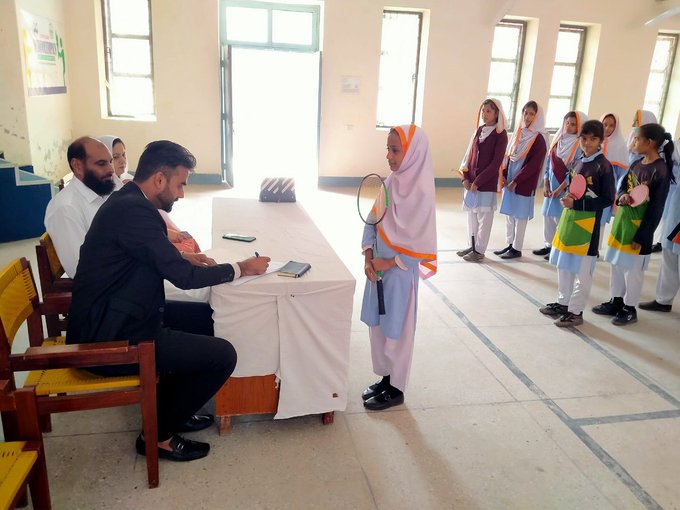
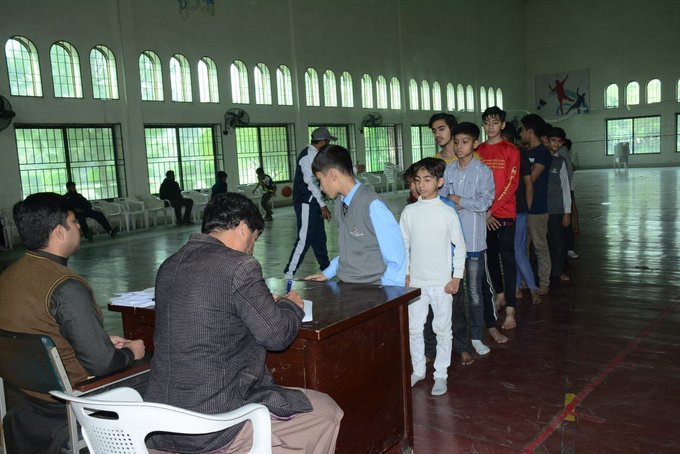
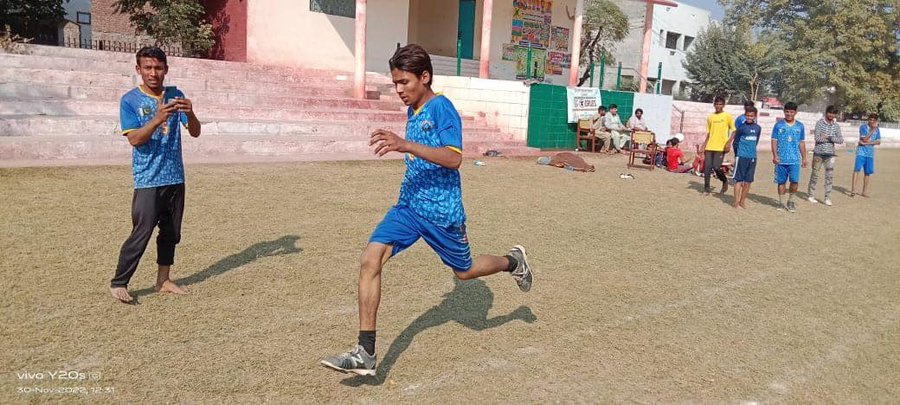
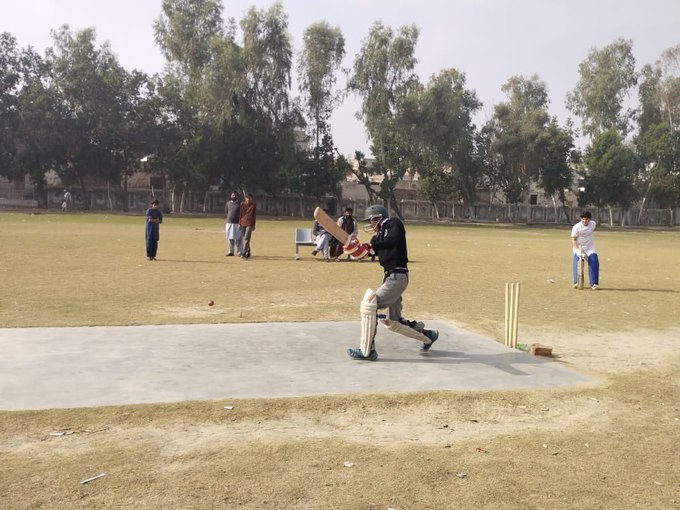
In the field of sports in the province of Punjab, the Directorate General of Sports and Youth Affairs of the Government of Punjab has taken a significant step, and right now the largest talent hunt programme in Pakistan is taking place at the level of public and private schools in relation to a variety of sports. Facilities that are up to date and in tip-top shape will be offered to the thousands of youngsters who were chosen for this opportunity so that they may achieve their full athletic potential in the sport of their choice.[1].
Second Students Summit; Dec 05, 2022, Lahore)
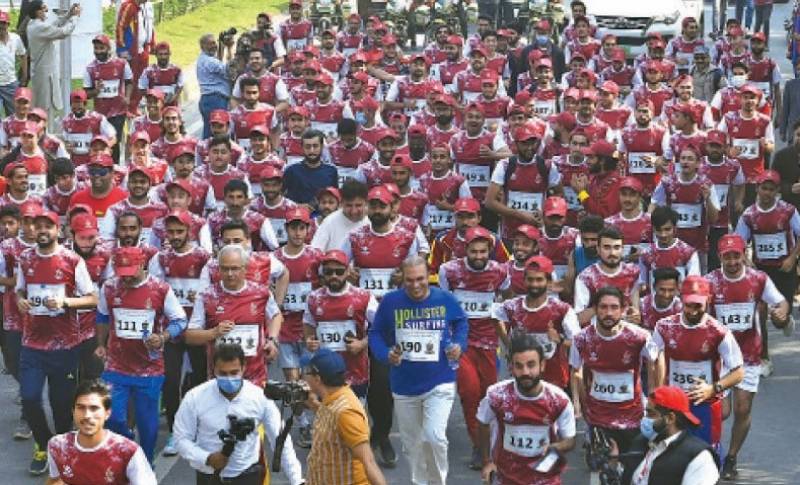
To begin off the second “All Pakistan Summit for Students’ Societies,” participants ran from the Governor House to the Govt College University in Lahore, a distance of around 5 kilometres. The festivities kicked off in the Governor’s House. The first-ever female participants in the marathon completed the three kilometres from GPO Chowk to the university’s Clock Tower. Prof. Asghar Zaidi, vice chancellor of GCU, also participated in the marathon. Many young and old people participated in the marathon run, which was kicked off by Mr. Amir Jan, Commissioner of Lahore. There were quite a few people along the roadside to see the show. Both dignitaries handed out awards to the winning students in the marathon event. Consistent with Olympic tradition, the winners also received bottles of olive oil and bottles as part of their rewards. The student summit was a hit with the youngsters. The GCU and the Punjab Department of Youth Affairs and Sports are hosting the summit to bring together students from both public and private institutions of higher education.[2].
Focus Group Discussion on Youth Voter Turnout, Dec 07, 2022; Islamabad
PILDAT hosted a focus group discussion with a group of young people on December 07, 2022 in Islamabad. The purpose of the youth focus group discussion was to have a two-way conversation with young people, learn about the barriers that prevent them from participating in Pakistan’s election processes, and figure out how to overcome those obstacles. A total of 12 young people from across Pakistan were asked to take part in the focus group, and their feedback was compiled. Five questions were posed to the groups:
- Why do you believe that youth does not vote in elections?
- Why is today’s youth not interested in politics & the electoral process of Pakistan?
- What can be done to improve youth voter turnout? What further steps may the ECP, political parties and government departments adopt to increase youth voter turnout?
- Why do political parties not put up more young candidates?
- Why should there be or not be a youth quota in National & Provincial Assemblies?
Key takeaways from the FGD included:
- Voter apathy stems from a lack of knowledge about the voting system and the running candidates
- Disbelief in the electoral college and its ability to ensure that the most qualified candidate wins
- Unfortunately, young people are not seen as a valuable part of the system
- A generation of young people who have been used for electoral purposes and then forgotten has neither gratitude nor a feeling of responsibility
- Manifestos fail to pique the attention of young people because they are out of date and not relevant to their lives
- Neglect occurs as a result of dynastic politics and nepotism
- Because of the illegality of student unions, young people are marginalized and ignored
- The leaders of official youth government organizations are not young people themselves, and political parties are not welcoming to them
- Physical danger, illegal activity, and the possibility of youth going ‘missing’ all make this an unsafe environment for young people to explore
- Worry of being publicly ridiculed
- The stigma attached to politics, especially for women, and the bias against women in political office contribute to the widespread belief that “aurton ke liye nahi hai.” (Not a job for women)
- There are disadvantaged, vulnerable youth in rural regions, and parties do not focus on them
- Due to a general lack of regard for politicians in general, few young people are interested in entering the field
- Various rules on college campuses actively prohibit any kind of political participation
- Youth participation in the political system requires a fundamental shift
- There is not an equal playing field for political parties let alone young people, particularly for those with unorthodox ideologies
- It’s almost illegal to express oneself
- Including civics lessons in the curriculum is essential
- In order to ensure a fair election, the ECP must ensure that voting locations are secure and safe environments where standard operating procedures (SOPs) and rules are adhered to
- Activities and discussions should be geared for young women
- Enhancing ECP’s own capabilities, with a focus on promoting gender equality, democracy, and legal literacy
- The electable system must change, and new candidates must be given a fair shot
- Encourage Political parties’ use of televised debates modelled after the US Presidential Debates to rally young voters
- An emphasis on young people within the ECP
- A more accessible and user-friendly ECP website is required
- Political campaigns need to use tools like social media, infographics, and websites to spread their message to the youth
- Young people have been promised things that haven’t been delivered on; they are aware that tickets would be handed out in favor of dynastic politics headed by young politicians
- Young people lack financial security, thus political parties must provide campaign funds for them
- The young of today do not have faith in political parties, and the parties do not have faith in the youth because they believe that the youth will not abide by the party’s rules
- Promoting young leaders in rural areas is important since rural voter participation is higher than urban voter turnout
- There is no strengthening of party infrastructure, and youthful talent is not being developed
- The majority voted in favor of a youth quota because:
- Being the leaders of the future, young people should have a voice in government
- A quota system may be the catalyst that finally gets political parties and lawmakers to recognize the value of having young voices in government
- Young people’s faith in the system and the resulting increase in diversity and fairness brought about by quotas
- Reasons given by dissenters of youth quota:
- First, young people should be given direct tickets; if that doesn’t work, the quota system may be brought in
- It will encourage dynastic politics and family favoritism
- For the quota system to be effective in recruiting young people from underrepresented groups, political parties must demonstrate political maturity
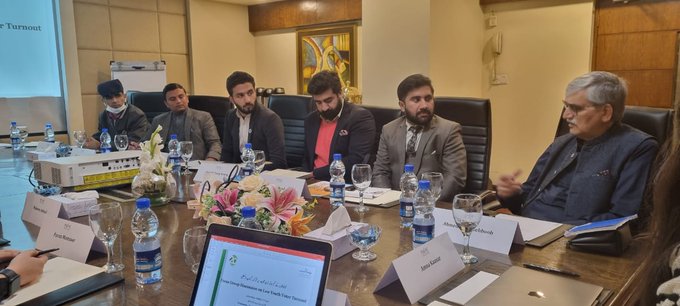
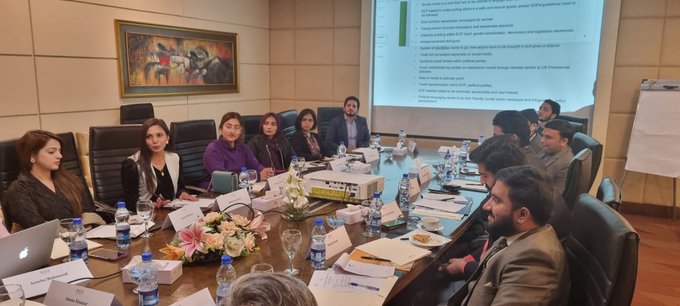
PILDAT Dialogue on National Voters Day, Dec 08, 2022, Islamabad
On December 08, 2022 PILDAT celebrated National Voters Day by holding a dialogue with members of the general public, youth, political party representatives, legislators, members of civil society, academia, and the media to talk about the voting process for the upcoming general elections and the steps that need to be taken to make sure they are free and fair, as well as to increase youth voter participation. In his capacity as president of PILDAT, Mr. Ahmed Bilal Mehboob presided over two separate panel discussions.
The topic of the first panel discussion was How to Ensure That the Upcoming General Elections Will Be Free, Fair, and Credible, and it focused on the upcoming elections. Syed Talat Husain, an experienced journalist, Mr. Haroon Shinwari, who is in charge of Pakistan’s Election Commission’s Media and Outreach Wing, and Mr. Fahd Husain served as panelists. Mr. Fahd Husain has the status of Federal Minister and is Special Assistant to the Prime Minister of Pakistan on Public Policy & Strategic Communications.
Mr. Husain made the observation that there is pressure to ensure that the upcoming elections are free, fair, and transparent because they will determine both the stability of our nation and the trajectory the country will take over the course of the next few years. A system has to be devised and rapidly implemented in a short period of time in order to be ready for the subsequent elections.
The Election Commission of Pakistan’s point of view on election-related issues was delivered by Mr. Haroon Shinwari, who is a member of the ECP’s Media and Outreach Wing. He also detailed some of the steps that the ECP is doing to ensure that elections are both fair and credible. They have spent 47 million Pakistani Rupees (PKR) on awareness initiatives to achieve inclusiveness, which is one of the factors that determines whether or not an election is valid. There will be a total of one hundred thousand polling stations around the country for the elections in 2023, and each of those polling stations will have four voting booths to accommodate a total of one thousand six hundred voters over the nine-hour voting day. A real-time results system has been evaluated and will be used in the next general election to reduce the likelihood of contested elections.
A distinguished journalist by the name of Syed Talat Hussain offered some commentary on the probable fairness of the elections in 2023 by detailing some of the difficulties that voters face at the polls. In order for voters to feel at ease, the electoral process has to be simplified, especially with regard to logistics. To make the voting process more convenient and up to date, polling places should be located in close proximity to each residential area. The ECP has to develop into a system that is both more complex and more adaptable so that voting may be brought directly to the doorsteps of residents. He believes that the next elections might potentially bring forth new issues as a result of power politics.
The topic of the second panel was Youth Voter Education and Information: How to Increase Youth Voter Participation, and it was discussed how to increase the number of young people who vote. Rana Ihsan Afzal Khan, who is the Coordinator to the Prime Minister on Commerce and Industry, Ms. Arifa Noor, who is a Senior Journalist, and Mr. Haroon Shinwari, who is the Media and Outreach Wing of the Election Commission of Pakistan, were the panelists for this discussion.
Young people are referred to as the country’s future; said Rana Ihsan Afzal Khan. Khan urged young people to become involved in the administration of the nation. However, when voter turnout is evaluated, young people are found to be in the minority; Pakistan has to find a solution to this conundrum. Youth make up the majority of the voting group. Young people need to understand that it is the government that makes policy decisions that have an effect on both their day-to-day lives and their futures; as a result, their involvement in decision making is very important. He remarked this in reference to Pakistan in comparison to other countries: “Democracy in other nations has gained maturity and established continuity, while Pakistan’s history is rife with interferences.” In addition to this, he emphasized the relevance of local governments, saying that they would be the ones to engage the young and find solutions to their problems on a local level. In Pakistan, the process for submitting a candidacy is flawed, and there are various barriers in the way of young people who are striving to hold leadership positions.
Ms. Arifa Noor, an experienced journalist, said that rather than focusing attention on young people specifically, it should be brought to people’s attention that Pakistanis do not vote. Since fifty percent of the population is comprised of people who are under the age of 35, the circumstance should be described as one in which Pakistani citizens are not participating in the voting process rather than labelling these people as being young. The political discourse does not center on the difficulties that face either our nation or our young people, which neither engages nor encourages the young people to vote. Without political stability, programmes would be constantly susceptible to modification, and it would be impossible to quantify the amount of progress made. She emphasized the importance of change occurring inside political parties and said that whenever a new generation comes into being, new leadership should be presented in order to attract the interest of younger people.
Mr. Haroon Shinwari, who is with the Election Commission of Pakistan (ECP) Media and Outreach Wing, presented a few statistics regarding the young voting population as well as the steps that the ECP has taken to improve youth awareness. These steps include the Voter Education programme as well as gender sensitization programmes. Young people would be encouraged to run for office and express their concerns at the local level if local governments were active in all provinces, which is why local governments should be active in all provinces.
There were approximately two hundred people in attendance at the National Voters’ Dialogue that was hosted by PILDAT in Islamabad. Among the attendees were representatives from civil society, academic institutions, foreign embassies in Pakistan, attorneys, engineers, business owners, and journalists. In addition to these participants, both current and former members of PILDAT’s Youth Parliament Pakistan were there to witness the ceremony.
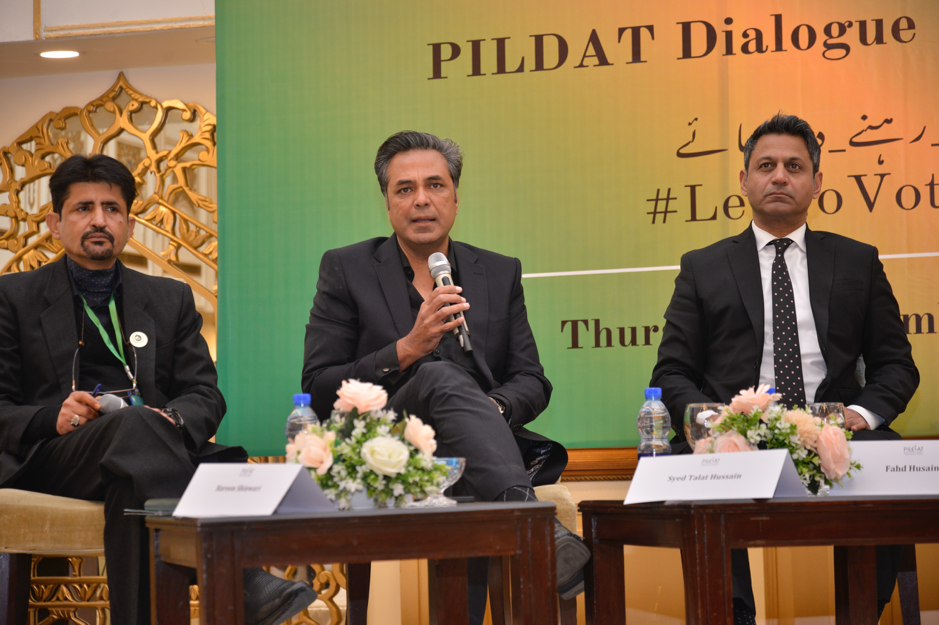
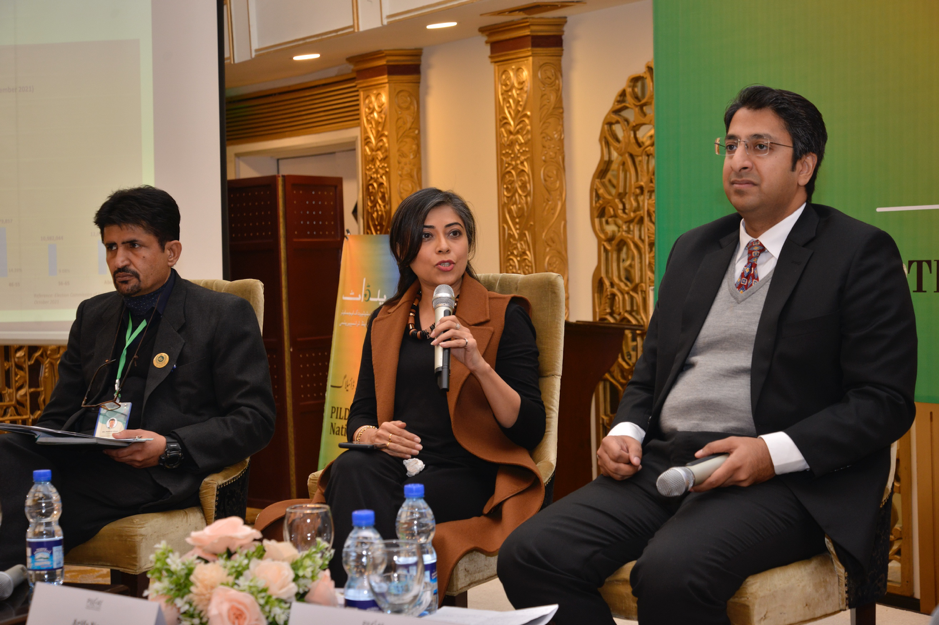
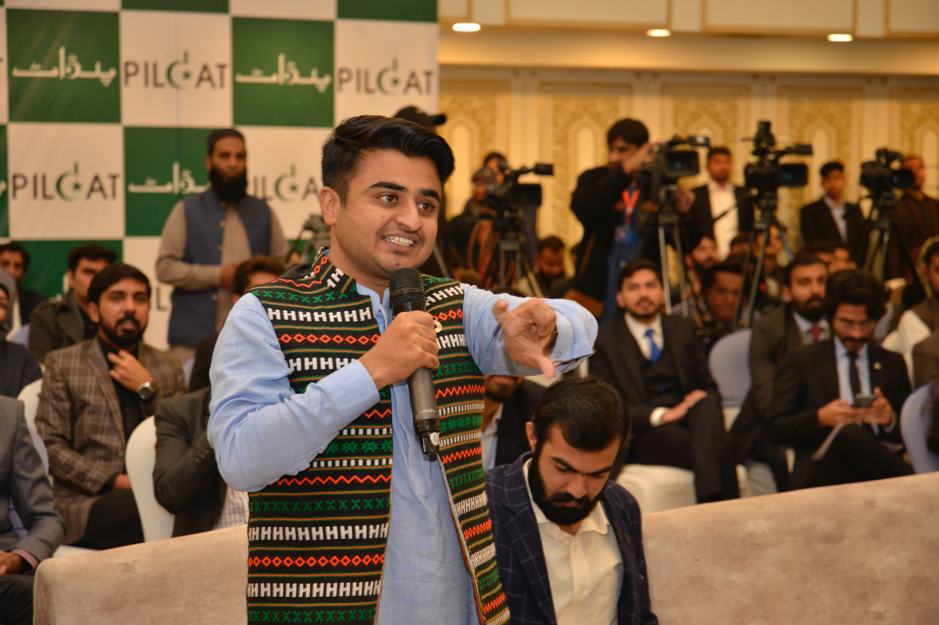
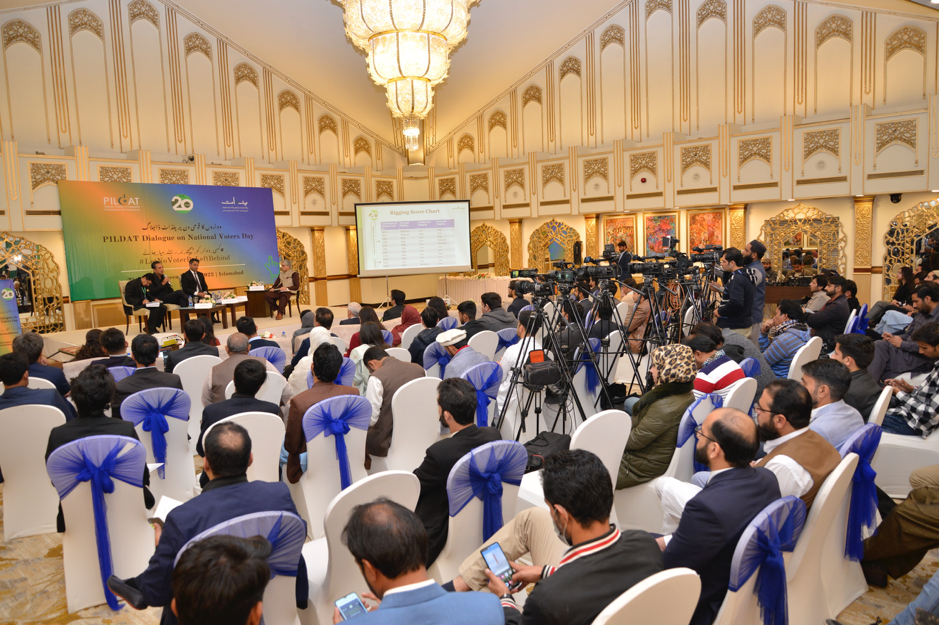
Agriculture & Microfinance added to Youth Loan Programme; Dec 12, 2022, Karachi
The “Prime Minister’s Youth Business and Agriculture Loan Scheme (PMYB&ALS)” has made addition of the categories “agriculture” and “microloans” to the programme. According to an announcement made by the State Bank of Pakistan in Karachi, new components of interest-free microloans and farm loans have been introduced to the programme. These new components were included in the scheme. As a result of the modifications, the sizes of loans have been divided into three distinct categories. Tier 1 grants loans of up to 0.5 million rupees, Tier 2 grants loans of between 0.5 million and 1.5 million rupees, and Tier 3 grants loans of between 1.5 million and 7.5 million rupees.[3].
Students of Gordon College Stage a Protest Against the Privatization of the Institution; Dec 10, 2022, Rawalpindi
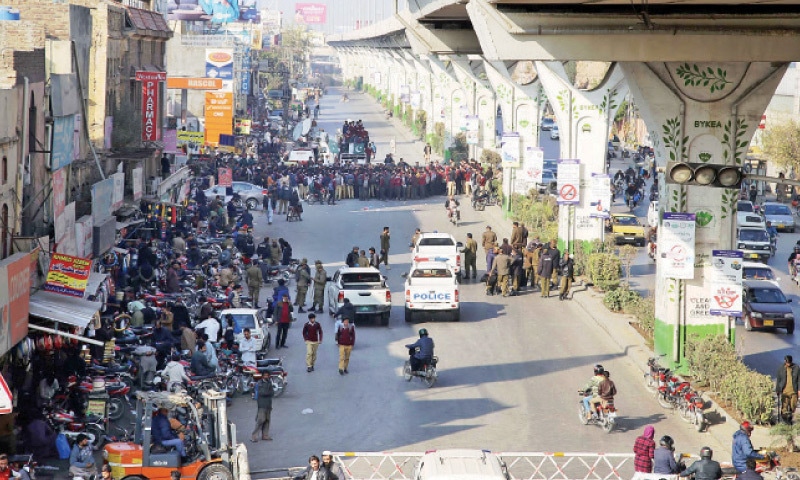
Students and faculty members of Gordon College staged a demonstration in opposition to the proposed privatisation of the government college. They also made a solemn commitment to fight any efforts that would see them handing over control of the educational institution to a Presbyterian Church in Pakistan. The students and professors who were involved in the protest on Murree Road caused the greatest traffic gridlock that anybody has ever seen in and near Raja Bazaar. The demonstration continued for three hours. The demonstrators refused to release the barrier until their demands were accepted, which made it impossible for the traffic police to effectively control traffic. It should be added here that the institution was nationalised in 1974, and that beginning in the 1980s, at least two religious organisations located in Sialkot and Lahore have been attempting to regain control of the college. Even though the matter was still being considered by the Supreme Court, the government of Punjab allegedly gave an assurance to the church that it would be given control of the institution.[4].
A staggering majority of young people favour holding elections sooner rather than later
Voice of Youth is a youth opinion series recently launched by PILDAT’s Youth Parliament Pakistan (YPP) to display the feedback obtained from Pakistani youth (aged 18-29) domestically and globally on a variety of sociopolitical and economic concerns and difficulties they face in Pakistan. In this regard, PILDAT conducts regular public opinion polls with the members of the YPP, which consists of young representatives from 272 constituencies of the National Assembly of Pakistan as well as representatives from Azad Jammu and Kashmir, Gilgit-Baltistan, and Overseas Pakistanis roughly proportional to the population of each entity. In addition, there are over 600 alternates in these seats, bringing the YPP’s total membership to approximately 900. Current issues (on a local, national, and worldwide level) such as the economy, education, job prospects, technology, etc., as well as particular industries and areas of business interest, may be addressed as topics. The November issue focused on the General Socio-Political Situation & Youth Employment in Pakistan[5]. It was conducted from November 22 – December 02, 2022 with 311 young respondents from all parts of Pakistan. The following is a summary of some of the most essential responses collected from the survey. Complete survey results can be found on PILDAT and Youth Parliament Pakistan’s official websites: www.pildat.org and www.youthparliament.pk
In your opinion, which issues are going to be the most significant for the people of Pakistan in 2023 General Election? (Choose 3)
According to the youth surveyed, the top three issues that are going to be the most significant to the people of Pakistan to make decisive action in the 2023 General Election are: Rising Inflation, Unemployment & Corruption. Closely following them were lack quality education and availability; and rising cost of fuel within the country.
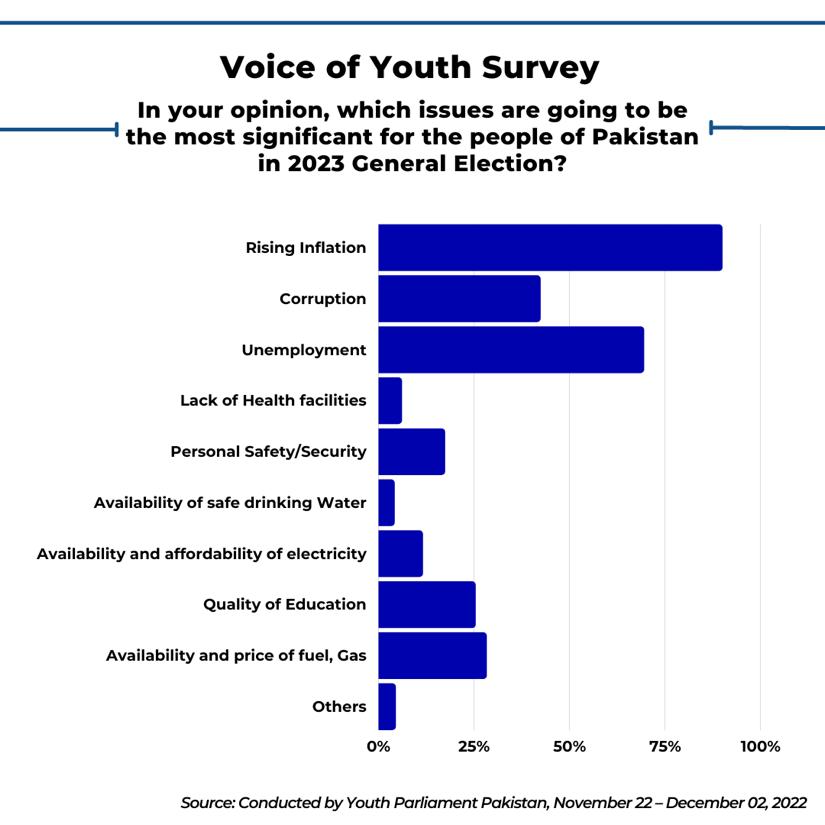
How far do you agree with the demand that next general elections should be held immediately in Pakistan?
A large group, 70.5%, of respondents are in agreement with the call for early elections while about 26.4% were in disagreement and believed that the next elections should be held as originally decided in 2023 and a small 3.2% were not sure.
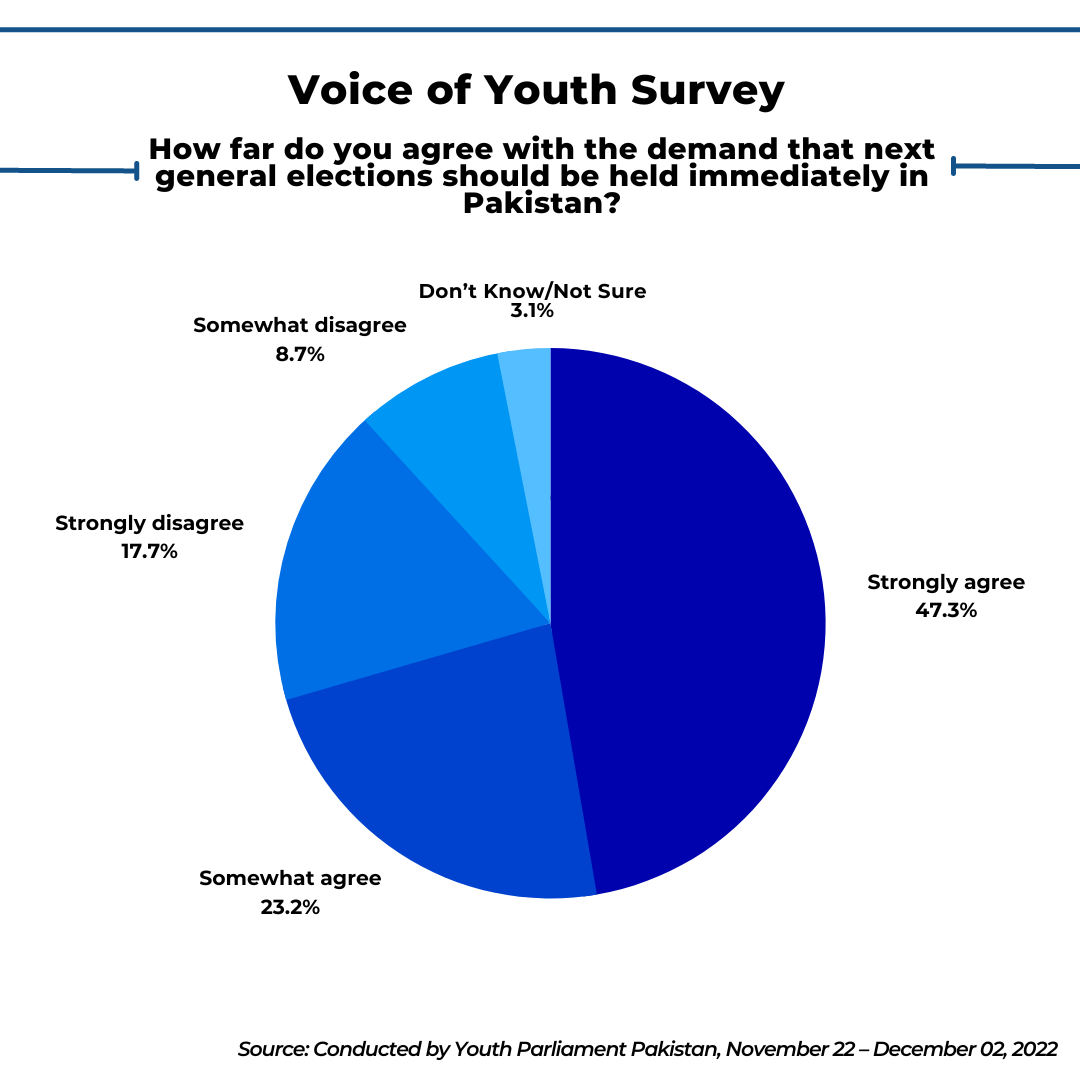
Do you intend to cast your vote in the upcoming General Election?
An overwhelming 92.3% of the respondents are determined to cast their vote in the upcoming general elections, which paints a more hopeful picture for Pakistan and its future as youth have always had low voter turnouts in the past elections.
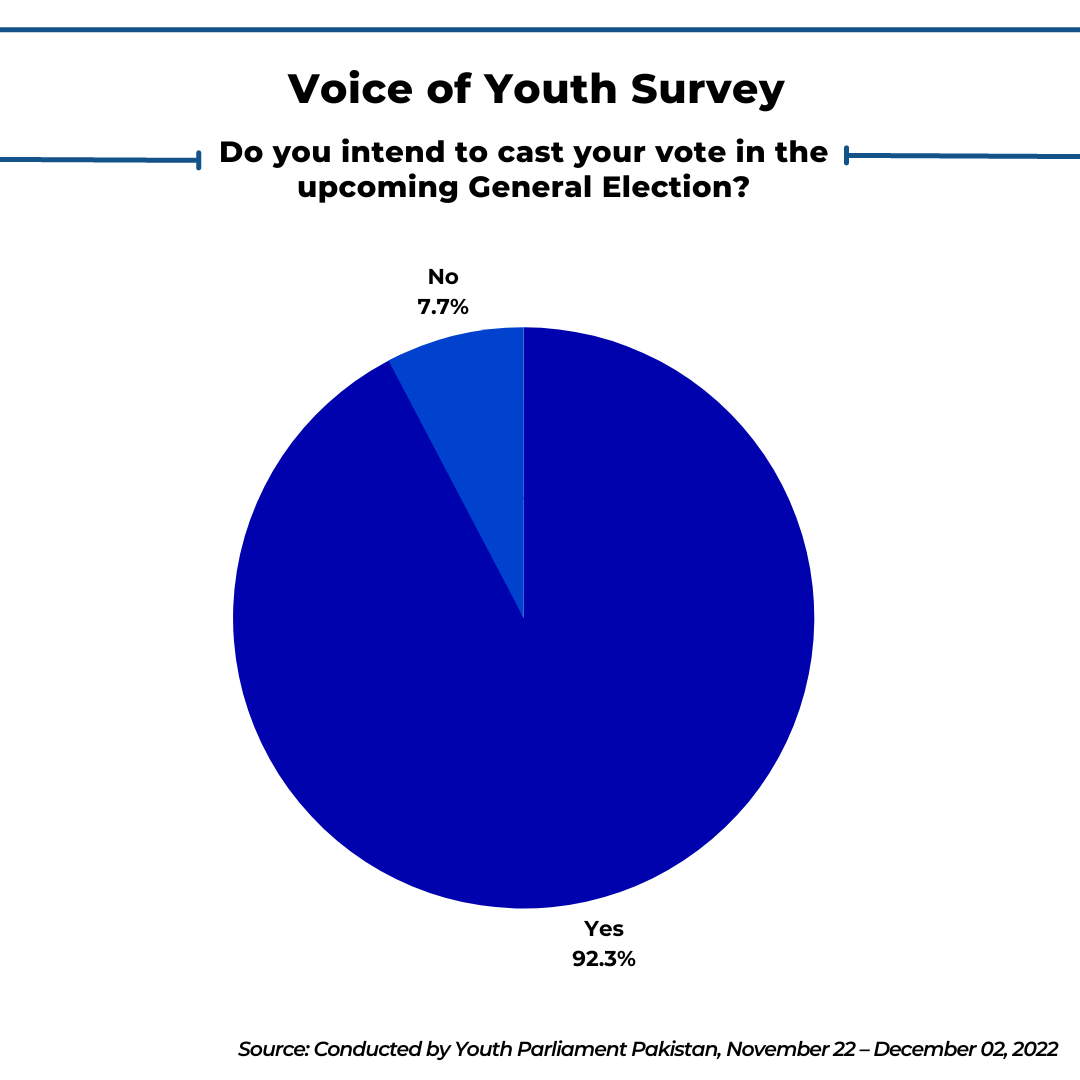
References
-
Twitter Account of DG Sports Punjab https://twitter.com/TariqQureshiPAS/status/1601517486650056704 accessed on December 21, 2022 ↑
-
Business Recorder https://www.brecorder.com/news/40212510/marathon-marks-start-of-second-students-summit-in-lahore accessed on December 21, 2022 ↑
-
Shahid Iqbal, Dawn, https://www.dawn.com/news/1726055/agriculture-microfinance-added-to-youth-loan-scheme accessed on December 21, 2022 ↑
-
Dawn website. https://www.dawn.com/news/1725658/protest-against-proposed-privatisation-of-gordon-college-leaves-traffic-haywire-in-pindi accessed on December 21, 2022 ↑
-
PILDAT website. https://pildat.org/youth1/voice-of-youth-edition-iv-youth-and-employment accessed on December 21, 2022 ↑






